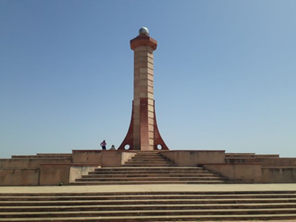Modi Calls for Road Map to Develop Mangarh Dham as a Global Tribal Destination
26-08-2023
12:18 PM
1 min read

What’s in today’s article:
- About Mangarh Massacre (Historical background, Reasons, Bhil Tribe)
- News Summary
Why in news?
- Prime Minister Narendra Modi called for preparing a roadmap to develop Mangarh Dham in Rajasthan’s Banswara district as a tribal destination with a prominent identity at the global level.
- Mangarh Dham, situated near the Rajasthan-Gujarat border, is known for massacre of tribals by the British Indian Army in 1913.
About Mangarh Massacre:
- In November 1913, soldiers of the British Indian Army fired indiscriminately on Bhil protesters who were demanding the abolition of bonded labour.
- Approximately 1,500 Bhil tribals and forest dwellers died in the incident which came to be known as the Mangarh massacre.
- The movement was led by Guru Govindgiri who raised a front against local rulers who were forcing the Bhils into unpaid labour, to pay heavy taxes and high rates of land revenue.
- According to the book 'A History of Rajasthan', Govindgiri's representatives submitted a charter of demands and a list of grievances against the Rajput States after which the British called upon the Bhils to leave Mangarh Hill before November 15, 1913.
- When that didn't happen, the princely kingdoms of nearby Dungarpur, Banswara and Sunth pressured the colonial government who then sent in the Mewar Bhil Corps to attack the Mangarh Hill.
- In 1952, an annual fair was instituted in Mangarh in memory of Guru Govindgiri and his disciples.

About Bhil Tribe:
- Bhils are considered as one of the oldest tribe in India.
- Once they were the ruler in parts of Rajasthan, Gujarat, Malwa, Madhya Pradesh and Bihar.
- They are a cross section of great Munda race and a wild tribe of India.
- Bhils could be identified as one of the Dravidian racial tribe of Western India and belong to Australoid group of tribes.
- They speak a language of Dravidian origin. Bhils are Hindus by religion.
News Summary
- Prime Minister Narendra Modi addressed a public meeting at Mangarh Dham to mark the anniversary of the Mangarh massacre and commemorate tribal leader and social reformer Guru Govindgiri.
- Mangarh Dham is located in Rajasthan’s Banswara district.
- At the event, Prime Minister declared Mangarh Dham as a National Monument.
- PM Modi said the memorial raised at the place was a symbol of bravery and sacrifice of tribals.
- He said such an impactful event of the freedom struggle had not found its place in the history books because of “unfortunate circumstances”.
- Modi said since Mangarh Dham was a shared heritage of the people of Rajasthan, Gujarat, Madhya Pradesh and Maharashtra, the governments of the four States could work together and prepare a roadmap to bring the memorial site on the world map.

